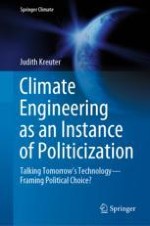
2021 | OriginalPaper | Buchkapitel
1. Talking Tomorrow’s Technology, Framing Political Choice?
verfasst von : Judith Kreuter
Erschienen in: Climate Engineering as an Instance of Politicization
Aktivieren Sie unsere intelligente Suche, um passende Fachinhalte oder Patente zu finden.
Wählen Sie Textabschnitte aus um mit Künstlicher Intelligenz passenden Patente zu finden. powered by
Markieren Sie Textabschnitte, um KI-gestützt weitere passende Inhalte zu finden. powered by